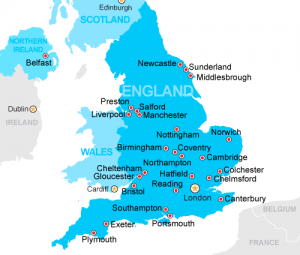United Kingdom
 The United Kingdom is made up of England, Wales, Scotland and Northern Ireland. It has a long history as a major player in international affairs and fulfils an important role in the EU, UN and Nato.
The United Kingdom is made up of England, Wales, Scotland and Northern Ireland. It has a long history as a major player in international affairs and fulfils an important role in the EU, UN and Nato.
The United Kingdom is a developed country and has the world’s sixth-largest economy by nominal GDP and eighth-largest economy by purchasing power parity. It was the world’s first industrialised country and the world’s foremost power during the 19th and early 20th centuries. The UK remains a great power with considerable economic, cultural, military, scientific and political influence internationally.
The UK has been a permanent member of the United Nations Security Council since its first session in 1946. It has been a member of the European Union and its predecessor the European Economic Community since 1973; it is also a member of the Commonwealth of Nations, the Council of Europe, the G7, the G8, the G20, NATO, the Organisation for Economic Co-operation and Development (OECD) and the World Trade Organization.
England is part of the United Kingdom (along with Northern Ireland, Wales and Scotland). It is situated to the west of Eurasia and has an extensive coastline. Such a positioning is responsible for its fairly complex climate, which demonstrates the meeting of the dry continental air and the moist maritime air. This creates rather large differences in temperature ranges and also leads to the occurrence of several ‘seasons’ over the course of one day.
Generally speaking, the parts of England closest to the Atlantic Ocean experience the mildest temperatures, although these are also the wettest and experience the most wind. The areas in the east, on the other hand, are drier and less windy, but also display cooler temperatures.
England is warmer and sunnier than any of the other countries making up the United Kingdom. The month with the most sunshine is July, which is also England’s driest month.
On average, the sun shines for about 1340 hours every year in England. The south coast has the clearest skies (i.e. the least cloud cover) due to the prevailing winds in that area. This means that counties like Kent and Sussex benefit from significantly more sunshine, attracting local and international visitors to their shores. The cloudiest areas are in the northern and western parts of England as well as in the mountainous areas.
Britain has four distinct seasons of fairly equal length – spring, summer, autumn and winter. In winter it is colder and wetter and the days are shorter than in summer.
Regional variations
Different parts of the UK experience slightly different regional climates. These can be summarised as:
- North East – cool summers, cold winters, steady rain all year
- North West – cool summers, mild winters, heavy rain all year
- South East – warm summers, mild winters, light rain all year, especially summer
- South West – warm summers, mild winters, heavy rain all year, especially winter
